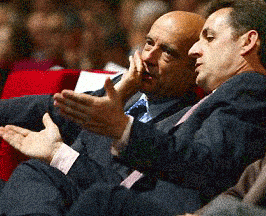 (Pictured: France’s Foreign Minister Alain Juppé and President Nicolas Sarkozy.)
(Pictured: France’s Foreign Minister Alain Juppé and President Nicolas Sarkozy.)
“The status quo cannot be maintained, things need to get moving… if there is a single chance, it must be grabbed,” declared French Foreign Minister Alain Juppé to Le Monde before departing for a diplomatic trip to Israel and the West Bank with the goal of relaunching the peace process. After a layover in Rome where he met with PLO Chair-President of the Palestinian Authority Mahmoud Abbas, he flew to Ramallah to speak with Palestinian Prime Minister Salam Fayyad and met Benyamin Netanyahu in Jerusalem. Juppé was hoping to convince each party to come back to the negotiation table at a conference to be held in Paris before the end of July.
The conference was originally planned as a meeting of potential donors to the state of Palestine, but France now wants to expand the scope of the event to a resumption of peace talks toward the two-state solution. “We are convinced that if nothing happens before September, the situation will be very difficult for everybody at the UN General Assembly,” Juppé said on Thursday, referring to Mahmoud Abbas’s plan to request international recognition of the State of Palestine on the 1967 border and admission as a full member of the United Nations at the September assembly.
The negotiations between Israel and the Palestinian Liberation Organization broke down last Fall. Netanyahu’s conditions for their resumption include Abbas’ break of relations with Hamas and the recognition of Israel as the nation of the Jewish people, while Abbas is requesting the immediate freeze of the expansion of settlements in the West Bank. However, Juppé believes that grounds have shifted significantly enough to hope to revive the process; according to him, the context of the Arab Spring, the Fatah/Hamas reconciliation and Obama’s acknowledgment of the 1967 borders are factors that have the potential to create a new opportunity to resume discussions.
The French Foreign Minister further echoed Nicolas Sarkozy’s previous statement that France would be ready to “take on its responsibilities” at the UN General Assembly in September, a “strong message,” according to Juppé. The innuendo is most likely to be interpreted as a decision for France to recognize the state of Palestine, an option that Sarkozy has already declared to be considering “in consultation with [France’s] European partners;'” yet his preference lies in a resumption of peace talks, which would prevent France from taking such a critical foreign policy decision.
Juppé’s trip fits into Sarkozy’s increasingly prominent will to see France play a larger role in the Israel-Palestine peace process. “Americans won’t succeed on their own,” he said in an interview in May. But while France is attempting to present itself as an alternative mediator, it is evident that its position does not differ from the United States’ in any significant way. In opposition to the U.S., Alain Juppé welcomed the reconciliation between Fatah and Hamas as a “positive development.” The demarcation, however, stops there.
Indeed, Juppé specified that were the proposed Paris peace conference to take place, it would proceed according to the roadmap President Obama recently outlined. Phyllis Bennis and FPIF senior analyst Stephen Zunes have vehemently emphasized the flaws of Obama’s line. “President Obama identified the principles of U.S. diplomacy and Israeli demands as the ‘foundation for negotiations.’ But he is wrong. The only foundation that will work is that of international law and human rights,” writes Bennis.
Juppé further follows in the US footsteps by maintaining a rhetoric which revolves around the security of Israel first and foremost, with no mention for Palestinians’ security. His recent statement that “We must drive Hamas to evolve in the direction we are hoping for, which means renouncing violence and recognizing the state of Israel” is representative of the usual double-standard though which demands are made of Palestinians but not of Israelis: Juppé is not demanding that the members of Israel’s government who refuse to recognize Palestine do so, nor is he denouncing Israel’s crimes against Palestinians. Juppé conveniently chooses to push back the issues of refugees and Jerusalem to the following year, focusing only on the issues of borders and land swaps.
When, in a recent radio interview, Juppé was faced with a journalist who questioned France’s potential to be heard, he answered, “Who is heard these days, can you tell me?” implying that the international community was powerless at large to influence the situation. Yet his assessment is incorrect in the case of the United States: it is not that Obama is not heard, it is that he does not speak up. In a recent interview, Phyllis Bennis explained how the U.S. has failed to put proper pressure on Israel: “We never saw real pressure, what we saw from the US president Obama was a series of requests: ‘Please stop expanding settlements!’ Israel said no, the US continued to request, Israel continued to say no and the US stopped requesting. Real pressure would have meant that when Israel said no, that the US said ‘all that 30 billion dollars we’re paying you in military aid over these ten years, you can kiss that goodbye.'”
France’s leverage is much more limited, revolving primarily around its position as president of the G8 and G20 and the potential moral impact that its recognition of the state of Palestine would have at the next UN General Assembly. Whether or not Israel and Palestine come to the table that is offered to them in Paris, it is unlikely that a safe, secure and sovereign Palestinian state might result from the process as long as the United States do not use their own extraordinary leverage to push Israel to respect human rights and international law.